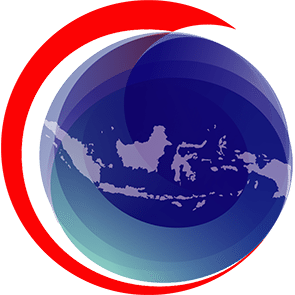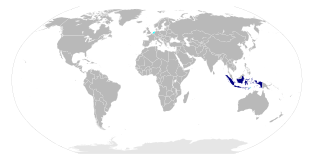
The Provinces of Indonesia are the 34 largest subdivisions of the country and the highest tier of the local government. Provinces are further divided into regencies and cities, which are in turn subdivided into subdistricts (kecamatan).
The following table indicates declared Indonesian government national holidays for the year 2018 only—cultural variants also provide opportunity for holidays tied to local events. Beside official holidays, there are the so-called "libur bersama" or "cuti bersama", or joint leave(s) declared nationwide by the government. In total there are 15 public holidays, and 5 "cuti bersama" or joint holidays.
The Indonesian National Armed Forces (TNI) uses a simplified ranking system for the three branches of Indonesian Army, Indonesian Navy and Indonesian Air Force. Most of the ranks are similar with differences for the rank titles of the high-ranking officers. Exception exists, however, in the ranks of the service members of the Indonesian Marine Corps. While Indonesian Marine Corps is a branch of the Navy, the rank titles of the Marine Corps are the same as those of the Army, but it still uses the Navy's style insignia.

Indonesian passport is a travel document issued by the Government of Indonesia to Indonesian citizens residing in Indonesia or overseas. The main governing body with regards to the issuance of such passport(s), possession(s), withdrawal and related matters is the Directorate General of Immigration under the Ministry of Law and Human Rights. Indonesia is one among many countries in the world that does not recognize multiple citizenship for its citizens and such citizens will automatically lose her/his Indonesian citizenship if another citizenship is acquired voluntarily. Special exceptions allow newly born citizens to hold dual nationalities until his/her eighteenth birthday after which a choice of either nationalities should be decided. The latest Indonesian passport has different national birds and sceneries on each page.

The Second United Indonesia Cabinet was inaugurated on 22 October 2009, two days after the inauguration of Susilo Bambang Yudhoyono as President of Indonesia for the second term. The cabinet consists of members from Yudhoyono's Democratic Party and its coalition partners as well as non-party figures.

The Ministry of Home Affairs is a ministry of the Government of Indonesia responsible for matters of home affairs. It is headed by the Minister of Home Affairs, currently Tjahjo Kumolo.
A Surat Perjalanan Laksana Paspor is an Indonesian travel document issued to persons who do not have other appropriate travel documents, for the purpose of proceeding to and from Indonesia. There are several categories of SPLPs, covering both Indonesian citizens and non-Indonesian citizens. Indonesia also issued a travel document known in English as an Alien Passport, a two-year 24-page document which is separate from the SPLP.

The Ministry of Education and Culture is a government ministry which organises early childhood education, elementary education, secondary education and community education affairs and the management of culture within the Indonesian government. The ministry formerly organised higher education affairs until the presidency of Joko Widodo, when higher education affairs were transferred to the Ministry of Research, Technology and Higher Education.

The Ministry of Law and Human Rights is an Indonesian ministry that administers laws and human rights. It is responsible to the president, and is led by the Minister of Law and Human Rights, Yasonna Laoly, since 27 October 2014. The first minister was Soepomo.

The Ministry of Communication and Information Technology is a ministry of the government of Indonesia that is responsible for communication and information affairs. The ministry reports to the president is and led by a minister.

The Ministry of State Owned Enterprises is ministry that oversee the development of state-owned enterprises in Indonesia. The ministry is headed by a Minister of State Owned Enterprises, who is accountable to President.

Ministry of Agriculture is a ministry which oversees the development of agriculture in Indonesia. The ministry is headed by a Minister of Agriculture, who is directly responsible to President.

Coordinating Ministry for Economic Affairs is the Indonesian government ministry in charge of planning and policy co-ordination, as well as synchronisation of policies in the fields of economics. The ministry is led by a Coordinating Minister for Economics Affairs, who is Darmin Nasution since 12 August 2015.

Coordinating Ministry for Maritime Affairs is the Indonesian government ministry in charge of planning and policy co-ordination, as well as synchronisation of policies in the maritime affairs. Coordinating Minister for Maritime Affairs is, the person who led the ministry, Luhut Binsar Pandjaitan.

Coordinating Ministry for Human Development and Cultural Affairs is an Indonesian coordinating ministry. The ministry has the function to coordinate, synchronized and control governance in human development and culture.

Ministry of Industry is an Indonesian ministry. The ministry is under, and is responsible to, the President of Indonesia.
Hansip, literally translated as Civil Defense, was a type of local security officers of an administrative village in Indonesia. Based on Presidential Decree No. 55/ 1972, Hansip is part of defense and security component in Total Defense and Security System.
Hansip was disbanded in 2014 by Presidential Regulation No. 88/ 2014. One of consideration of such retraction is according to government regulation No. 6/ 2010, task and function of hansip is already conducted by municipal police, locally known as Satpol PP.
Gayam is a subdistrict in Bojonegoro Regency, East Java, Indonesia. It was created in 2012 from the merger of 12 villages that previously were parts of Ngasem and Kalitidu district. Gayam becomes a new focus of attention as Banyu Urip oil field, the petroleum exploration site of ExxonMobil under the Cepu Block contract area, is located in this district.

Chief of the Indonesian National Police or commonly abbreviated as the National Police Chief is an official who is the highest leader in the Indonesian National Police (Polri) organization.














